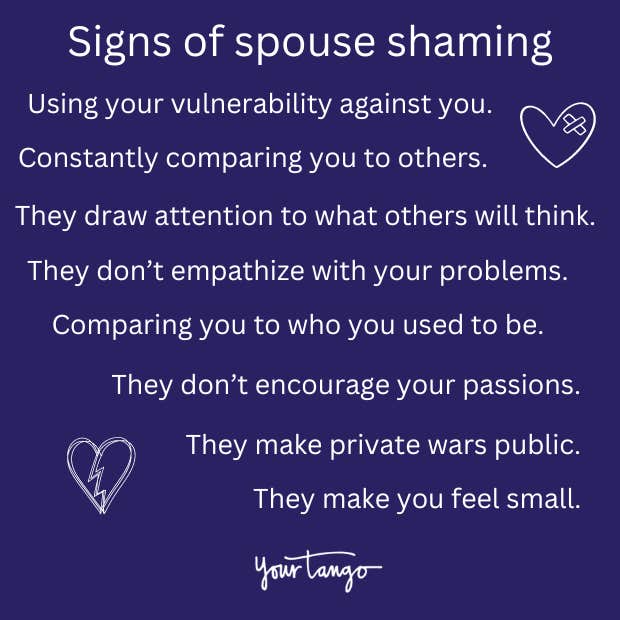8 Signs Your Partner Is Shaming You (And You Don't Even Realize It)
Recognize the signs.
 zulufoto / Shutterstock
zulufoto / Shutterstock Downward cast eyes, hunched shoulders, and head down — one way or another, we have all been victims of spouse shaming before.
The not-so-often talked about yet ever-present emotion of shame is prominent in culture, and detrimental not only to ourselves but to our relationships as well.
Author Brené Brown, otherwise known as the vulnerability "superhero," has spent her life's work researching shame and vulnerability. She has indicated that most people fear being vulnerable because of their shame. She also finds evidence that vulnerability is the glue that holds relationships together.
Without vulnerability, shame is likely to take a foothold in your relationship that will produce hostility and resentment.
Before figuring out whether or not you're being shamed in your relationship, it's important to discuss the difference between shame and guilt. Guilt is being sorry for something you have done. It's apologizing, reconciling, and working to do and be better. Guilt is a positive emotion that can channel change and growth.
However, shame is being sorry for who you are. Fundamentally, it's the difference between "I made a mistake" and "I am a mistake."
With that in mind, imagine what it would be like to constantly feel like you're the mistake in your relationship. It's beyond distressing. The shame others place on us can steadily eat away at our self-love and self-esteem. It may not be intentional, but often those closest to us can make comments and behave in ways that drive two big tapes: 1) you're never good enough, and 2) who do you think you are?
By placing shame in a Petri dish, Brown has discovered that shame needs three things to grow exponentially: secrecy, silence, and judgment.
The following comments and behaviors in a relationship are practices that foster levels of secrecy, silence, and judgment that create an emotional cesspool of toxic shame.
8 Signs of shaming in relationships
1. They see your vulnerability as a weakness and use it against you.
"Man up. You have to be stronger." Sound familiar? This mantra is devastatingly common in our culture and we hear it regardless of gender. Often labeled as "too emotional" and "too needy," I've been on the recipient end of this advice.
Our society has a knack for seeing vulnerability as a weakness. Albeit, there's no way to build trust and loyalty if your partner is constantly feeding into the ideology that vulnerability equals weakness, even making jokes about emotions and experiences you shared in confidence.
2. They constantly compare you to others.
"You are just like your mother/father!" This wouldn't be so bad if it was meant as a compliment, but let's face it: it usually isn't. Comparison is the thief of happiness and is a serious shame trigger.
Another common statement would be "(name of ex) would never have done something like this" or "(name of friend)'s wife/girlfriend doesn't make it like this."
It's just as demoralizing to be told you aren't as good as someone or don't do something as well as someone else. All the way from your career and household chore habits, to how you dress and the way you wear your hair, there's no need to be compared to anyone else.
As Dr. Seuss would say, "There is no one alive who is you-er than you" and your partner should be able to see the beauty in that.
3. They compare you to who you used to be.
People are dynamic — they change and grow over time. It's near impossible for you to be the same person today that you were a year or two ago. It's not uncommon to hear things like, "Why don't you ___ like you used to?"
Brown discusses this form of comparison when she states, "Nostalgia is also a dangerous form of comparison. Think about how often we compare our lives to a memory that nostalgia has so completely edited that it never really existed." There's a lot of pressure and even judgment by asking rhetorical questions that point to you not being as "good" as you used to be.
On the other hand, if your partner draws parallels to a former version of yourself that you aren't proud of, this is also unacceptable and just another example of using your vulnerability against you.
4. They don't empathize with your problems.
Some of the worst things to hear when feeling upset are "Stop being dramatic" or "Don't you think you're overreacting?" There's a lot of judgment behind comments that drive the tape of "that's not a big deal."
You make yourself extremely vulnerable when you ask for help or share your worries, and the last thing you need to hear is how "small" your worries are. It's discouraging and disheartening, and another inconspicuous strategy that invokes shame.
5. They don't celebrate or encourage your passions.
Sharing your successes, passions and ideas leave you just as vulnerable as sharing your anxieties and struggles. Hearing comments like, "That's ridiculous" or "That will never work" can cause you to easily shut down.
You begin to disengage as a defense mechanism and take on an attitude of "It's better if I don't talk about this so I won't get hurt." This is where silence starts to creep into your relationship and cultivates a manifestation of shame.
6. Their tone and body language make you feel small.
It isn't always what is said that matters as much as how it's said. Notice how your partner uses anger and disapproval in their tone and in their comments.
When they speak to you, do you immediately feel small, as if you're 10 years old again? Are they sarcastic? Do they roll their eyes, huff and puff, or give you nasty looks?
This is a common indicator that you're being shamed in your relationship, and odds are you know it deep down and just haven't acknowledged it yet.
7. They emphasize or draw attention to what others will think.
Statements like, "Are you sure you want to wear/do that? Don't you care what so and so will say?" are recurrent in shaming relationships. Your appearance may be just one of the many places where your partner is incessantly reminding you to consider what others will think.
It may range from your career to your finances and even your friends. The attitude of caring about what others think may say a lot more about your partner's personal battles than your own
Stop caring about what other people think, or allowing anyone to convince you to care about what other people will think. Choose to be with someone who cares more about what makes you happy than what others will think about your life choices.
8. They make private wars public.
According to Hypnotherapist Keya Murthy, "When a spouse mentions personal conversations or details to friends and family at gatherings right in front of the partner," it's a sure sign of spouse shaming.
"Instead of withdrawing or challenging them in front of others, you can tell them it's not fair to make a private war public."

What to do if your partner is spouse shaming you
If you find yourself in a relationship with someone who shames you, it's time to call it what it is.
In life, you cannot confront something that you cannot name.
Love yourself enough to either address your partner and work through it, or walk away and move forward. The antidote to shame is empathy. Your partner would need to reposition themselves in a way that lends them to being empathetic toward your needs, fears and wants.
Relationship Coach Heather Lee Donaldson says, "The key is to not be dependent on your partner doing something and not to blame and shame them about their behavior. Instead, communicate needs, wants and boundaries, adult to adult. If there is no agreement, then it is not fair to blame and shame."
There are so many aspects of our life that we have no control over. Fortunately, you control and choose who you share your life with and who you allow yourself to be vulnerable with. Choose wisely. Your partner should love not you not only in spite of your flaws, but because of them.
In the words of Brown, "You are imperfect, you are wired for struggle, but you are worthy of love and belonging. Imperfections are not inadequacies; they are reminders that we are all in this together."
You don't deserve to feel shame or feel bad for who you are. Don't feel inadequate or unworthy of love.
You aren't alone in your journey and it's because of your imperfections that you're worthy of so much more than what you're currently facilitating in your relationship.
Nia Ita is a writer and author who specializes in analyzing emotions to find the heart of the problem and make improvements for a better quality of life.
